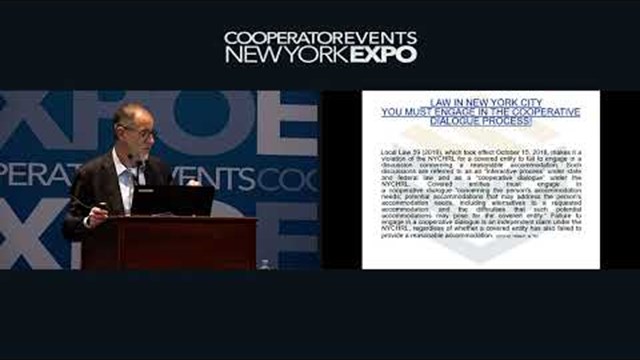—Worried in West Harlem
“The New York City Human Rights Law has been interpreted to require that landlords, including cooperatives and condominiums, must make a “reasonable accommodation” to the needs of a handicapped person,” says Marc J. Luxemburg, a partner with the New York law firm of Gallet Dreyer & Berkey, LLP. “The law does not contain any specific time limit for compliance. The obligation to provide a “reasonable” accommodation involves balancing between the needs of the handicapped person, and the nature, extent and cost of the physical alterations that might have to be made to provide such accommodation. The Board of Directors or Managers is not obligated to accept an accommodation request by the handicapped person but is entitled to decide what constitutes a “reasonable” accommodation. The question does not provide any details as to what action the board is taking in response to the request for an accommodation, specifically whether the board is actively working on a solution or simply attempting to ignore it.
“In the case of Pelton vs. 77 Park Ave. Condominium, 825 N.Y.S. 2nd 28 (1st Dept. 2006), a year elapsed after the Board of Managers was first advised of the requested accommodation. The board was then contacted by the city’s Commission on Human Rights. The board engaged architects to determine an appropriate method of accommodation, and also consulted legal counsel. Another nine months elapsed before a method of access was proposed by the board, to which the handicapped person would not agree. Nonetheless, the board proceeded with the installation as recommended by its experts. In the Pelton case, the action commenced against the board after the board determined to take action was ultimately dismissed on the ground that there was no violation of the statute, and the board had acted within the business judgment rule in the decisions that it made concerning the nature and scope of the accommodation ultimately decided on. It was further decided in the Pelton case that none of the individual members of the board had any individual responsibility for any failure on the part of the board collectively to act, and by extension it is clear that no individual shareholder would be personally liable for any non-action on the part of the board. However if a judgment was entered against the corporation, the shareholders would be obligated to pay their share as part of their maintenance, and cannot separate themselves from the corporate liability.
“In sum, so long as the board is proceeding in good faith to attempt to determine a reasonable accommodation, the fact that no final decision has yet been made does not lead to the conclusion that the corporation would be held liable.”







Leave a Comment